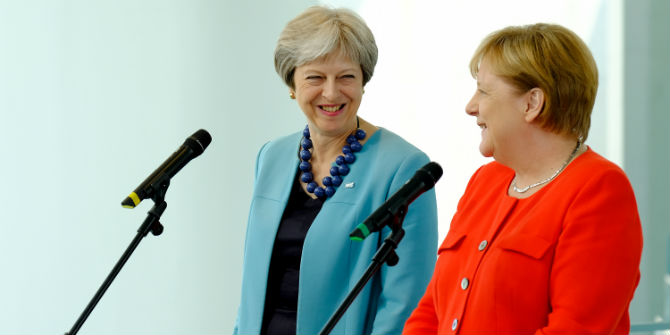LSE Brexit asked some of our academics to predict what kind of Brexit we can expect in 2020. Simon Hix says that while a no-deal Brexit is still entirely possible, Boris Johnson may want to protect vulnerable parts of Britain from the damage it will inflict.
The election result was a decisive mandate for Boris Johnson to “get Brexit done”. But there is still a lot of uncertainty about what that means in terms of where we are heading by the end of 2020.
On the one hand, several things suggest we’re heading towards a harder Brexit, or even perhaps a no-deal Brexit at the end of 2020. Johnson plans to put into UK law, in the Withdrawal Agreement to be passed by the British parliament, a commitment not to extend the transition period negotiations beyond December 2020. Dominic Cummings, Johnson’s top advisor, is back now at the heart of No 10 on the back of what many in the Conservative ranks feel was an election outcome that vindicated his strategy for the party, and from what we know of Cummings, he would prefer a no-deal Brexit (leaving the EU on WTO terms) to any commitment to follow EU regulatory rules after we leave the EU.

We hear from the EU side that any agreement must respect what Ursula von der Leyen, the new Commission President, calls “zero tariffs, zero quotas, zero dumping”. What the EU means by “zero dumping” is that the UK must agree to sign up to EU social and environment rules, as well as state aid rules, in return for extensive market access. If the EU plays hardball on this, the UK and the EU could easily fail to reach an agreement by the end of 2020. And, no doubt, Cummings and the ERG Conservative MPs will argue that if we’re heading for a no-deal Brexit, it would be better to get that out of the way soon (in December 2020 rather than December 2022), so that there is plenty of time to tackle the hit on the likely British economy and public finances before the next election, which is likely to be some time in 2024.
On the other hand, the big majority for Johnson in the Commons means that the veto threat of the hardcore Brexiters in the Conservatives is much weaker, and almost any deal Johnson brings back to the Commons will almost certainly be adopted. Furthermore, Johnson will now be conscious that he needs to deliver a Brexit that protects the interests of his new coalition in the Midlands and the North of England, where employment in many of these new Conservative constituencies is dependent on the agrifoods industry, manufacturing, and public services. A no-deal Brexit, or even a very basic trade agreement that includes tariffs and quotas on agricultural products and many industrial products, would hit employment in these parts of the country very hard. There would also be a major hit on public finances from a collapse of some key sectors and the short-term downturn in the British economy, and this fall in tax revenues would make it very difficult for Johnson to deliver on his promises for the NHS and infrastructure spending in the Midlands and the North. With that in mind, Johnson may be tempted to accept a softer form of Brexit, such as a comprehensive FTA, covering all goods sectors and some service sectors, but in return for the UK applying EU social, environmental and state aid rules.
In short, there’s a lot still to play for, and several very different outcomes are possible by the end of December 2020.
This post represents the views of the author and not those of the Brexit blog, not LSE.







Oh they wanted out of the EU at any cost. More important than our nhs. More important than having a decent standard of living. More important than their children and any family. Rule fcuking Britannia what a joke rule the waves how daft is that?
If the name of the game is hanging on to power, Bojo & Co will sacrifice the least risky stuff. My money is on whatever preserve the cherished ban on EU immigrants and immigration in general.
I would have liked to have read what the author think on this point.
The question on the ballot paper was in or out so I’m resigned to it. I’d rather stay, but appears that the areas which will feel it the most are areas that voted overwhelmingly to leave.
But I guess they are happy to trade on WTO terms. So be it.
What we have in our favour with regards horse trading is our security and armed forces and our fisheries.It would be a massive blow to the EU if we denied them access to our waters and we are the main contributors(European forces) when it comes to deploying military. In the majority of conflict areas we are usually the second highest force after the USA. Ukraine would not be happy if we suddenly withdrew our forces from their country.
It’s always good to hear from Simon – particularly so on New Year’s Eve. That’s what hard work looks like!
I think Simon is conflating an economic problem with a political problem. ‘No deal’ might be an economic problem, but we don’t know. It would be surprising if it was a serious problem, as anticipated catastrophes hardly ever happen, for obvious reasons. The political problem is who gets the blame if it comes to ‘no deal’.
Don’t make any bets that the Tories will be blamed. Not the least of the extraordinary features about this month’s general election, is that the blame for Brexit’s lack of progress was laid fairly and squarely at Labour’s door. It takes some doing, to persuade the public that the party which has been continuously in opposition since 2015, should carry the can. It has to be said that Labour cooperated beautifully. They, Gina Miller and the People’s Vote campaign were vociferously obstructive. Every voter in the country drew the obvious conclusions.
“What the EU means by “zero dumping” is that the UK must agree to sign up to EU social and environment rules, as well as state aid rules, in return for extensive market access.”
This statement is simply not correct.
All the EU FTAs, such the ones with Canada, Japan, South Korea or Mercosur, include a number of level playing field provisions. Yet, those level playing field provisions do not imply that these countries have to comply with EU social, environmental and state-aid rules. Usually, the level playing field provisions in the EU FTAs require the counterparts to follow a number of international rules. In the area of labour rights for example, the EU FTAs usually refer to the rules of the International Labour Organisation. In the environmental field, the EU might require compliance with the Paris Climate Agreement among others. These aren’t EU rules, but international rules.
It is possible that the EU will demand more stringent level playing field provisions from the UK than for other FTAs. But that doesn’t necessarily mean the same as “signing up to EU social and environmental rules, as well as state-aid rules.”
“We hear from the EU side that any agreement must respect what Ursula von der Leyen, the new Commission President, calls “zero tariffs, zero quotas, zero dumping”. What the EU means by “zero dumping” is that the UK must agree to sign up to EU social and environment rules, as well as state aid rules, in return for extensive market access.” Surely here a compromise ought to be possible, if both sides are reasonable? From the various policy announcements made so far by the Conservatives, it doesn’t seem as if the government actually wants to remove all social and environmental protections, or allow extensive state aid to support failing state sectors. (Remember what happened to Thomas Cook?) Ursula von der Leyen ought to be satisfied if there are rules which are in total at least as strict in the UK as in the EU, even though there may be some sectors where there UK has an advantage and some where the EU has an advantage. It would make it easier if any free-trade agreement could be terminated quickly if the UK was judged (by some independent arbitration panel, for example) to be taking unfair advantage. It shouldn’t be necessary for the UK to sign up in perpetuity to all EU regulations.
Boris is going to outlaw extension beyond 2020 and many experts and the commission itself believe that it is not possible to negotiate a comprehensive trade deal in 11 months. Hence as things stand we are facing NO Deal and disaster. However, this is very unlikely. Boris not worried about economics but politics; winning. He will not do anything to jeopardise his re-election and by the end of 2020 there will not be another election for another 4 years and no pressure and no need to repeat the slogan ‘Let us get Brexit done’. A no deal will put all those seats he gained from labour at risk of loosing. Even if most of them voted to leave, a No deal will hit them harder and they will not thank him in 2024 for getting them out of the EU in 2020 . As long as they get a good deal, by 2024, they would not care if the deal was done in 2020 or 2022. One thing we are certain about Boris is that he is not afraid to change his mind and he will do so again later this year and agree an extension..though he may leave it as late as possible.
What will be interesting to see is if Johnson adopts a No Deal Brexit style, how this will go down with voters. Following predictions of the Treasury and the Bank of England, the forecasted damage could leave those traditional Labour voters – which swung the vote in the Tories favour – to do them harm. Traditionally, most voters vote with their pockets, and if they become economically damaged by a No Deal, could this mean a reversal of the shifted political sphere experienced in 2019?
Even a FTA would be an interesting thought. Whilst it will give businesses security to know where they are, it still won’t sustain the heavy amounts of service trading we perform with the EU.
The truth of the matter is that whilst Johnson is in a much easier position to pass a deal than what Theresa May was, the hardness of getting a deal has not. Johnson now has to try and accommodate for a much wider demographic of the population than May ever did. If Johnson wishes to retain his majority in future elections, he’ll have to pull a miracle out of the bag.
I would agree with the key thought here: “While it will be easier for Johnson than May in the Commons, it will be no easier for him in Brussels”. Indeed it will undoubtedly be harder for Johnson in Brussels, as from February 1st the UK will be out of the EU Commission, the EU Council and the EU Parliament.